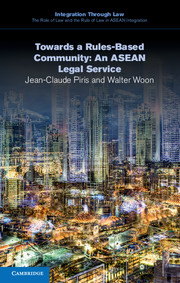Executive summary
Published online by Cambridge University Press: 05 March 2015
Summary
ASEAN was conceived in 1967 as a confidence-building measure to foster trust among the five original members of the association. The organisation has gradually expanded to cover all the states of Southeast Asia (with the exception of Timor Leste) and now extends to cooperation in practically all areas of the economy, foreign policy and government. This development, however, has been piecemeal and lacking in strategic impetus. An oft-ventilated criticism of ASEAN is that it is good at producing declarations, agreements, road maps and other instruments but bad at implementing them. The avowed goal of ASEAN is to create a community by 2015, comprising three pillars: the ASEAN Economic Community (AEC), the ASEAN Political-Security Community (APSC) and the ASEAN Socio-Cultural Community (ASCC). The primary framework document for this purpose is the ASEAN Charter. It is clearly stated in the Charter, and repeatedly re-emphasised subsequently, that the ASEAN Community will be rules-based and underpinned by the rule of law.
ASEAN has no ambition to become a supranational organisation with shared sovereignty. It will remain an organisation of nation states. For this reason, it is misleading to consider entities such as the EU as models. This is not what ASEAN aims to be, despite the reference in the Charter to an ASEAN Union. That may come in time, but not in the foreseeable future. The present goal, and one that will absorb the energy of the member states, will be the creation of the ASEAN Community. This cannot happen unless there is a culture of respecting the rules and following up on the many grand visions set out in various ASEAN instruments. Developing this ‘rules-based’ culture is vital to the creation of the ASEAN Community. Without that commitment to fulfilling the many obligations undertaken by the member states and following the rules they have agreed to, the ASEAN Community will be nothing but a mirage.
- Type
- Chapter
- Information
- Towards a Rules-Based Community: An ASEAN Legal Service , pp. 183 - 190Publisher: Cambridge University PressPrint publication year: 2015



